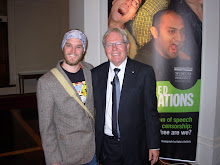Watching some films is an experience that is very difficult to put into words. Beat the Devil (1953) is such a film. Strangely though I could also sum it up quite well in one - absurd.
Generally I am attracted to movies from the 1001 list due to their reputation or director or from personal recommendations. The piece on this film in the book itself was what attracted me to this film though, making the film sound like one of Hollywood's truly original pieces. I also discovered it was directed by John Huston, one of the truly great old-school Hollywood directors who directed Key Largo (1948), an excellent Humphrey Bogart/Lauren Bacall/Edward G. Robinson vehicle that is a glaring omission from the 1001 list.
In the film the story really does not mean much. The piece from the book puts it best when it says “the story has something to do with uranium rights in Africa, but it's not really that important.” In reality this is a film essentially about people talking about exploiting African uranium deposits, but never reaching Africa. The only way such a film could possibly work is with a great script. Huston collaborated with non other than Truman Capote to deliver just that. The dialogue, which fills so much of the film's running time is delightfully surreal. I think I could sit down and read the script the whole way through and be intrigued, it's definitely one of my favourite pieces of screenwriting. It manages to skewer adventure yarn conventions without coming off as cheap parody, or even having these aspects dominate. Just a nice little aside. As well as being quite surreal (it features a character that was either heavily based on Muammar Gadaffi or heavily influenced him), the script is also very witty. If I was forced to pigeonhole the film into a specific genre, than comedy would be it. The repeated scheming and double crosses can seem a little convoluted until you give into it, and realise that it really doesn't matter, just sit back and enjoy the seemingly bottomless barrel of witty back and forths. This vein of humour is enhanced by a soundtrack which would not sound out of place accompanying a Looney Tunes cartoon, heightening the films more slapstick moments perfectly.
With Bogart really putting his weight behind the film, it was able to assemble a pretty stellar cast. This is one of my favourite Bogart roles. I occasionally find him a bit sour, but in this he shows off his comedic chops, whilst still bringing a bit of gravitas to a role which could have easily been flippant. I was very excited to see one of my favourite actors Peter Lorre pop up in this as well. This is an older Lorre, a far cry from the baby-faced villain in M (1931) It was nice to see Lorre in a lighter role, he has a terrific sense of comedic timing, and his English is also a lot better in this film than in films closer to his initial emigration. He injects his slightly comedic physicality into his role as one of the scheming associates brilliantly. The best performance in the film however comes from Robert Morley who plays another of the associates. The back and forth between Morley, Lorre and Bogart is sublime, and you can tell that the three were having a whole heap of fun mucking about with each other. If that is not enough for you, the film has maybe the strangest closing shot of a film I have seen. A close up of a letter, Bogart letting fly with an over the top laugh, and then saying “the end”.
Featuring boats and adultery, this film reminded me a bit of Alfred Hitchcock's Rich and Strange (1932) This is a better, more assured film than that early Hitchcock piece though. Sorry if I haven't been able to give you a real taste for the film, but it's a bit difficult to encompass what is going on here. The film is strange, beguiling, brilliantly acted, hilarious ... and did I mention absurd?
You can check out the absurdity here:
Verdict: Pint of Kilkenny
Progress: 27/1001
Subscribe to:
Post Comments (Atom)

No comments:
Post a Comment